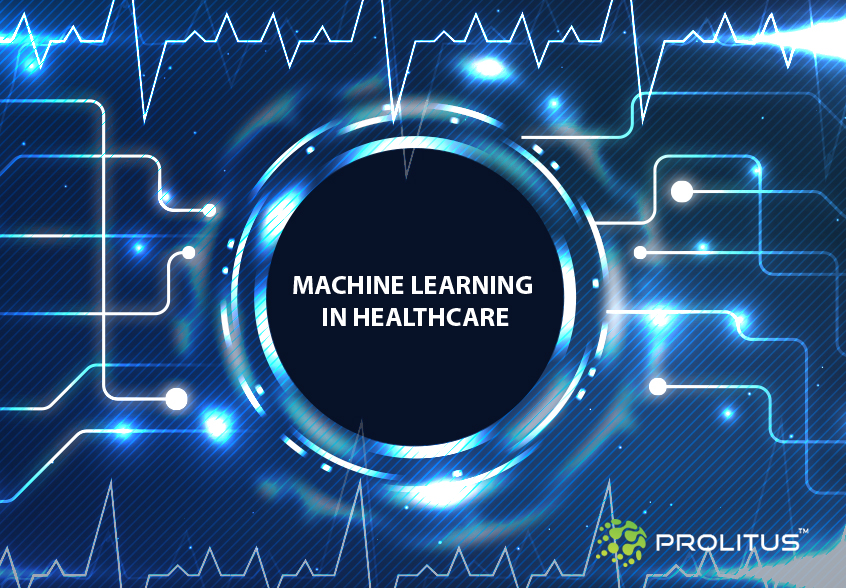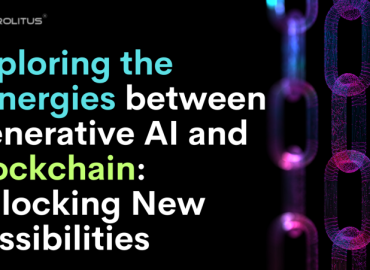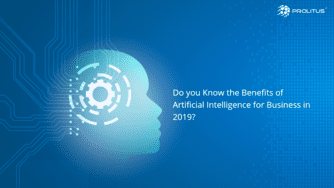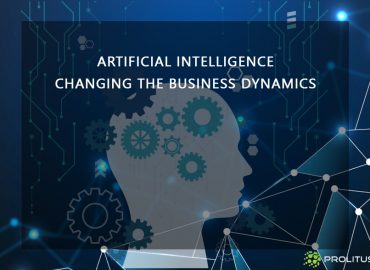We are living in the era where computer programs are developing the ability to learn automatically in order to improve their performance without explicit programming. Justifying the phrase, ‘the future is now’, these are computer programs that access data for their use and learn accordingly. Known by the name of Machine Learning, these programs are the leading applications of Artificial Intelligence.
It all begins with the observation of data through direct experience and instructions, to observe patterns and take decisions based out on the recognized patterns. Machine learning is carried out in 4 ways, through Supervised, Semi-Supervised, Unsupervised and Reinforcement Machine Learning Algorithm.
Through the analysis of large chunks of data, Machine Learning delivers accurate results quickly, assessing possibilities, identifying profitable opportunities and probable risks involved. With its development and success, major industries including, healthcare, finance, cybersecurity, retail, automotive, travel and media are leveraging the use of this disruptive technology.
While the Healthcare industry is expanding at an unprecedented rate, the exponential growth of population has crippled the required penetration of the industry. The healthcare providers are working hard to facilitate the patients to cure and serve, but that is not completely serving the required needs. And for meeting the current and growing requirements of the healthcare industry, providers need to work smart, with implementing Internet of Things and Machine Learning.
Today, Machine Learning is opening new channels of predictive treatment and medication for the healthcare industry, creating major impact across the healthcare landscape and generating ripples.
The major players, including Intel, Microsoft, IBM and Google are investing time and efforts to master this powerful technology. For instance, IBM’s Watson is functional in Medical Field since 2013 and Google’s DeepMind joined this realm later. Listed below are the areas where AI and ML are assisting the Healthcare Industry:
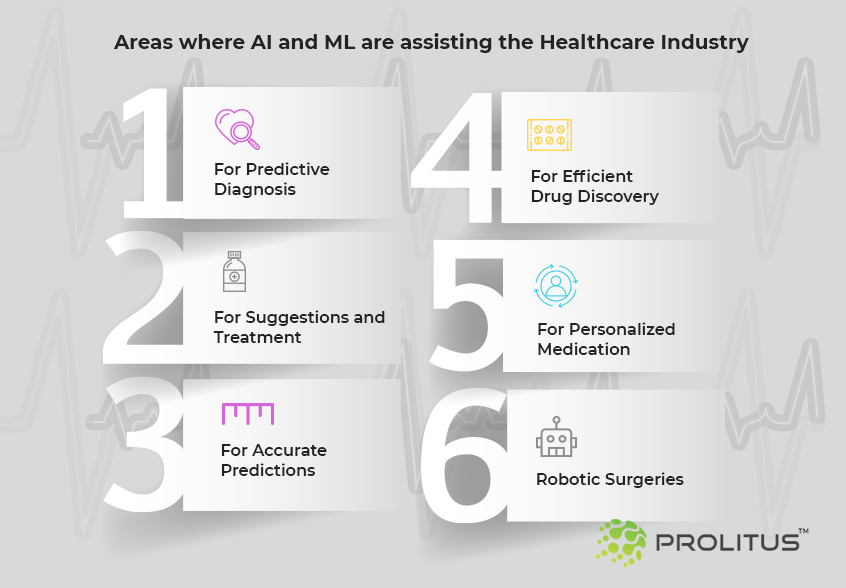
For Predictive Diagnosis
Diagnosis plays a crucial role in planning out the treatment strategy, much before the treatment begins. This process usually takes long, as requires several tests, before the process begins. Computer Vision not only is facilitating the doctors in assessing the intensity of the ailment in a well-defined manner, but at the same time, processing results faster.
In the case of tumors, doctors usually struggle with determining the extent of tumor growth. Microsoft’s InnerEye collates the scans and creates a 3D model, pinpointing the tumors and their growth. This program has brought down the diagnosis process from hours to merely minutes, allowing doctors to process and treat patients efficiently.
For Suggestions and Treatment
Diagnosis is a critical process, involving a range of factors to be considered, from dietary habits to the minutest details of the patient. A doubt is raised as for how a machine would assist the doctors in diagnosing the diseases and suggesting possible treatments. Let’s consider the example of Memorial Sloan Kettering Oncology Department (MSK), working with IBM Watson to solve this issue. IBM is processing the data of cancer patients and treatments provided by MSK over the years. This data is then processed using machine learning to create algorithms that are used to suggest diagnosis, along with possible treatments. The prognosis and other outcomes are further added to the data set that helps improve the algorithms. That’s how the machine continuously learns and improves.
ResearchKit by Apple is focused on collecting data from across mobile devices in order to generate a pool of live health data. It aims to find the treatment of Asperger’s syndrome and Parkinson’s disease through interactive apps, assessing their condition over time and pooling data for future studies.
For Accurate Predictions
One of the use cases of Machine Learning with Internet of Things is in predicting the health threats. It is possible through wearable sensors, embedded in smart watches and the IoT devices feeding this data directly to the Machine Learning programs to assess a person’s health data. This data will be compared with the medical history, habits and reams of data from hospitals to recognize patterns and anomalies to provide health risk predictions.
For Efficient Drug Discovery
This technology holds the ability to assist in the research and creation of new drugs. And the reason why Machine Learning is of great use in drug discovery is because, discovering and manufacturing drugs is a time and cost consuming process. This process is subject to check thousands of possibilities to reach out to one result and turn that result into an effective drug. Machine Learning can assist by speeding up the multi-step process, assessing probabilities and offering all possibilities on a much faster basis.
The leading American pharmaceutical conglomerate, Pfizer, is working with IBM Watson on immune-oncology research. IBM Watson will allow Pfizer to connect the dots and understand the knowledge that has been previously siloed in different areas. Mr. Shahram Ebadollahi, Vice President IBM Watson Health states that there are undiscovered links between different areas of expertise and these links would lead to create innovative combination medicines, acting as a game changer in the cancer therapy. The cognitive computing capabilities of IBM will help accelerate important medicines to the patients in need.
For Personalized Medication
Pinpointing diseases and planning personalized treatment is of immense significance and Machine Learning is set to play a vital role in the same. Through learning the data, programs can assist in finding genetic markers and genes to respond to certain medication. This treatment will differ from person to person, depending upon their genes and what medications they respond to, giving the right and effective cure. Machine Learning has the ability to learn the health records, family medical history and patterns of the sickness of a person, not only to predict health risks, but also to define right treatment plan and medicines. Add docs
Robotic Surgeries
With robots like da Vinci operating a grape with surgeon’s precision, it is not far enough in the future when robots will be assisting doctors in the operation theatres with their learnings and performing surgeries on their own. Recently, with the help of Machine Learning, a bot stitched up a pig’s intestine using its own vision, tools and assessments. Interestingly, this bot, Smart Tissue Autonomous Robot (STAR), did a better and quicker job than the doctors, given the same task. This success reflects the precise growth of Machine Learning by processing reams and reams of data.
Take Away
Machine Learning is a ground-breaking technology, all set to rejig the healthcare industry by addressing all the pain points, be it diagnosis, prediction of diseases or offering the right medicines. This technology, seen as a threat by many, aims more towards assisting doctors and healthcare providers in their tasks, instead of replacing them. Incorporation of Machine Learning in the healthcare industry is paving new roads to success.
